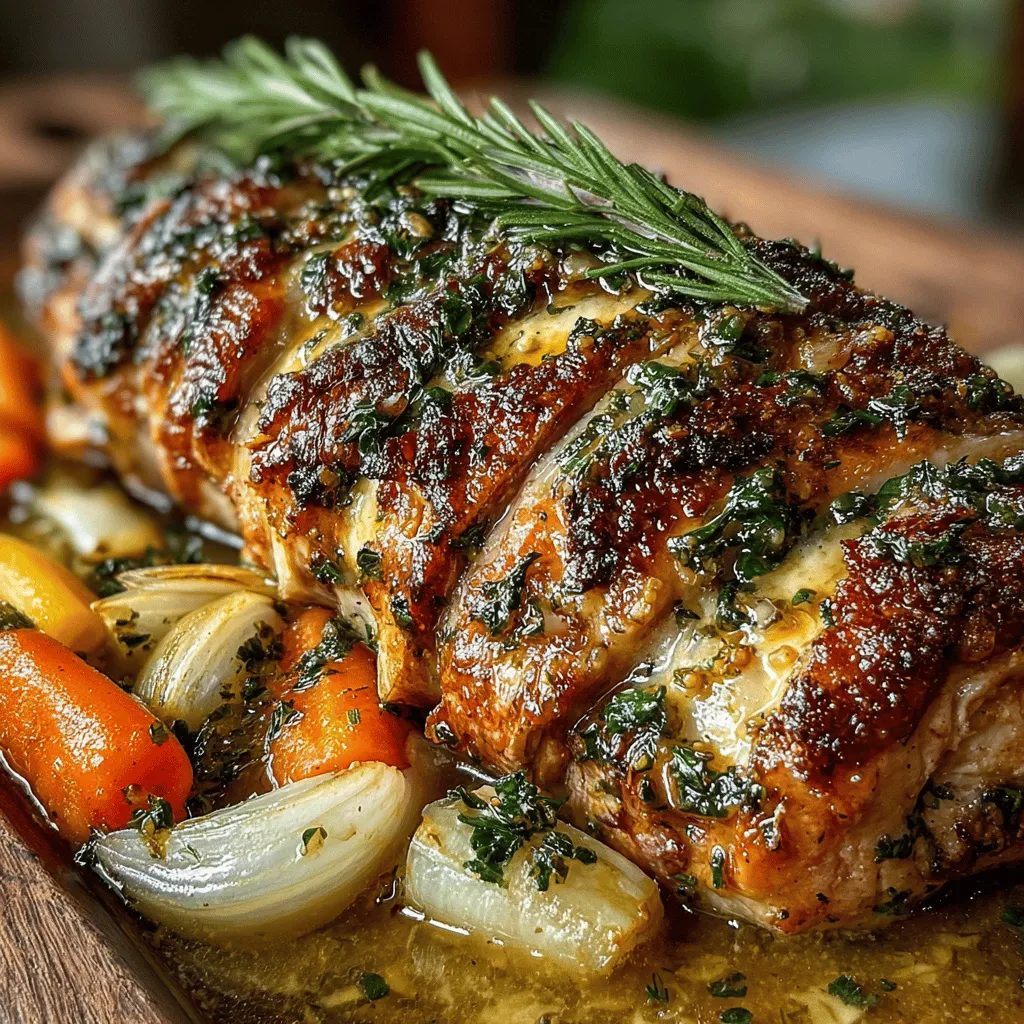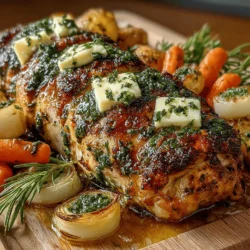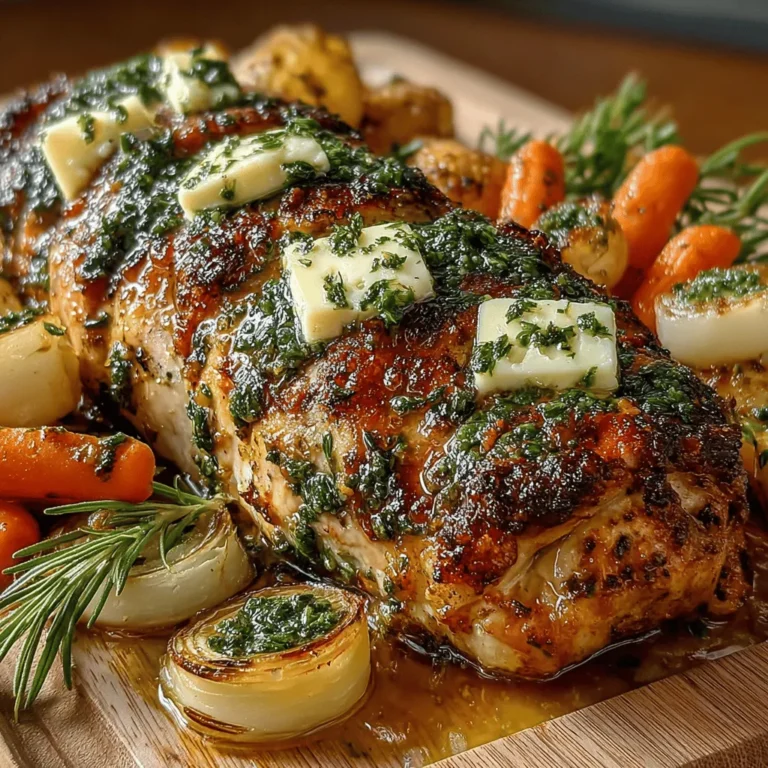Turkey has long held a place of honor in culinary traditions across the globe, often serving as the centerpiece for festive gatherings and special occasions. Whether it’s Thanksgiving, Christmas, or a family celebration, a beautifully roasted turkey can elevate any meal. This Herb Butter Roasted Turkey Breast recipe introduces a flavorful twist to the classic dish, ensuring a juicy and aromatic experience that will impress your guests. The use of fresh herbs and high-quality ingredients is paramount in enhancing the overall flavor profile of the turkey, making it a dish worth mastering.
Ingredients
– 1 bone-in, skin-on turkey breast (about 4-6 pounds)
– 1 cup unsalted butter, softened
– 4 cloves garlic, minced
– 2 tablespoons fresh rosemary, chopped
– 2 tablespoons fresh thyme, chopped
– 2 tablespoons fresh sage, chopped
– Zest and juice of 1 lemon
– 1 onion, quartered
– 2 carrots, chopped
– 2 celery stalks, chopped
– 2 cups low-sodium chicken broth
– Salt and pepper to taste
Instructions
1. Preheat your oven to 350°F (175°C).
2. In a medium bowl, combine the softened butter, minced garlic, chopped rosemary, thyme, sage, lemon zest, and lemon juice. Mix until well blended.
3. Pat the turkey breast dry with paper towels to ensure crispy skin.
4. Carefully create a pocket under the skin of the turkey breast by gently sliding your fingers between the skin and the meat. Be cautious not to tear the skin.
5. Take half of the herb butter mixture and spread it evenly under the skin, ensuring it covers the meat for maximum flavor infusion.
6. Rub the remaining herb butter all over the outside of the turkey breast. Season generously with salt and pepper.
7. Place the quartered onion, chopped carrots, and celery in the bottom of a roasting pan. This vegetable base will add flavor during the roasting process.
8. Set the turkey breast on top of the vegetables in the roasting pan. Pour the chicken broth around the turkey (not over it) to keep it moist during cooking.
9. Roast the turkey in the preheated oven for about 1.5 to 2 hours, or until the internal temperature reaches 165°F (74°C).
10. Baste the turkey every 30 minutes with the pan juices for extra moisture and flavor.
Understanding the Ingredients
The main ingredient in this recipe is a bone-in, skin-on turkey breast. Choosing bone-in and skin-on is essential for ensuring that the turkey remains moist and flavorful throughout the cooking process. The bones contribute to richer flavor, while the skin protects the meat from drying out.
The herb butter is the star of this recipe, consisting of unsalted butter mixed with fresh herbs. Unsalted butter is preferred because it allows you to control the amount of salt in the dish while providing a rich, creamy base for the herbs. Garlic, rosemary, thyme, and sage are the key herbs used, each bringing its unique flavor profile that complements the turkey beautifully. The addition of lemon zest and juice not only adds brightness and acidity but also balances the richness of the butter.
The vegetable base of onion, carrots, and celery plays a crucial role in developing depth of flavor during the roasting process. These aromatic vegetables release their natural sweetness and enhance the overall taste of the turkey. Lastly, low-sodium chicken broth serves to keep the turkey moist while providing an additional layer of seasoning control.
Step-by-Step Preparation Guide
The first step in preparing your Herb Butter Roasted Turkey Breast is to preheat the oven to ensure even cooking.
Next, you will craft the herb butter mixture. Combine the softened butter with garlic, herbs, lemon zest, and juice to create a flavorful blend. This mixture is vital as it infuses the turkey with rich flavors.
When preparing the turkey breast, it is essential to pat it dry to achieve crispy skin. Creating a pocket under the skin is a technique that allows the herb butter to meld directly with the meat, enhancing flavor throughout. Once you apply the herb butter, your turkey is ready for roasting.
Continue following the steps for a perfectly roasted turkey breast that will be the highlight of your next meal.

Tips for Distributing the Herb Butter
To ensure maximum flavor impact from your herb butter, effective distribution is key. Begin by gently loosening the skin of the turkey breast with your fingers, being careful not to tear it. Use a small spatula or your fingers to spread the herb butter evenly under the skin. This allows the flavors to penetrate the meat as it roasts. Once you have applied the butter beneath the skin, generously rub the remaining butter over the surface of the turkey. This creates a flavorful, crispy skin that enhances both the taste and aesthetic appeal.
Setting Up the Roasting Pan
The setup of your roasting pan plays a significant role in the overall flavor and moisture of the turkey. Start by placing a layer of aromatic vegetables, such as onions, carrots, and celery, at the bottom of the pan. These vegetables not only add flavor but also create a natural rack for the turkey breast, allowing for even cooking and moisture retention. Adding a cup of chicken broth to the pan will further enhance the moisture content throughout the roasting process, ensuring a succulent turkey.
Positioning the Turkey for Roasting
For optimal cooking results, position the turkey breast skin-side up in the roasting pan. This allows the skin to crisp up beautifully while the meat stays moist. The addition of chicken broth at the bottom of the pan helps to maintain moisture during roasting, making sure your turkey remains juicy and flavorful.
Roasting Process
Preheat your oven to 325°F (165°C) for even roasting. Place the turkey breast in the oven and roast it for about 20 minutes per pound. It’s crucial to monitor the internal temperature with a meat thermometer, aiming for 165°F (74°C) at the thickest part of the breast. This will ensure that your turkey is cooked through while still remaining juicy. For added flavor and moisture retention, consider basting the turkey with the pan juices every 30 minutes. This technique enhances the overall taste and helps create a beautiful golden-brown skin.
Resting the Turkey
Once your turkey breast reaches the desired internal temperature, remove it from the oven and let it rest for at least 20 to 30 minutes. Resting is crucial as it allows the juices to redistribute throughout the meat, making for a juicier turkey. Cover the turkey loosely with aluminum foil during this time to keep it warm without steaming the skin.
Carving and Presentation Tips
To carve the turkey breast, start by slicing against the grain to ensure tender pieces. Aim for even, thick slices for a beautiful presentation. Arrange the slices on a serving platter and drizzle with the pan juices for added flavor. To elevate your presentation, consider garnishing the platter with fresh herbs, citrus slices, or seasonal vegetables. This not only enhances the visual appeal but also complements the flavors of the dish.
Nutritional Benefits of the Recipe
Turkey is a lean source of protein, making it a healthy choice for any meal. Utilizing fresh herbs in the herb butter not only enhances the flavor but also provides additional nutritional benefits. Herbs like rosemary and thyme are rich in antioxidants and can contribute to your overall health. This recipe balances rich flavors with health-conscious choices, making it a great option for family gatherings or special occasions.
Conclusion
The Herb Butter Roasted Turkey Breast is an impressive yet approachable dish perfect for any occasion. With its flavorful herb-infused butter and succulent meat, this recipe guarantees a memorable dining experience. Embrace the joy of cooking with fresh ingredients and create lasting family traditions by trying this recipe at your next gathering. Your guests will be delighted by the rich flavors and inviting aromas that fill your home.


